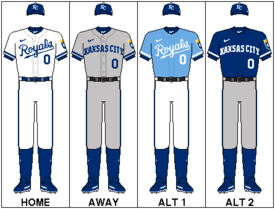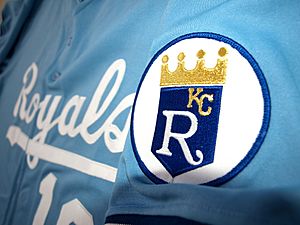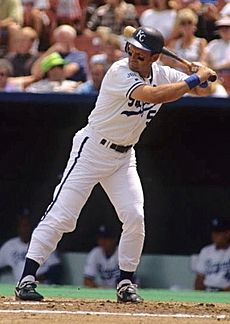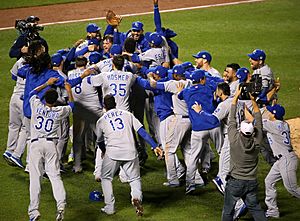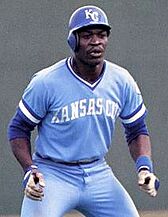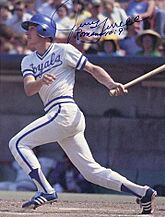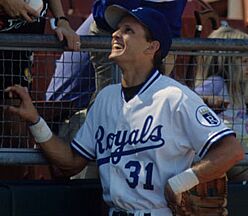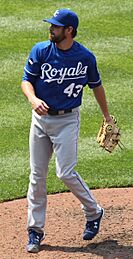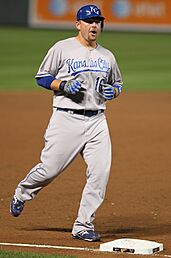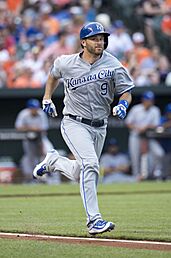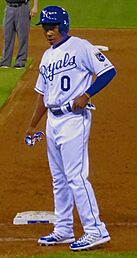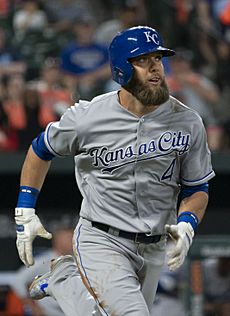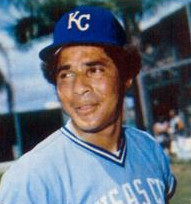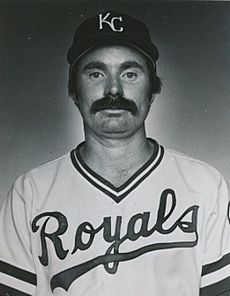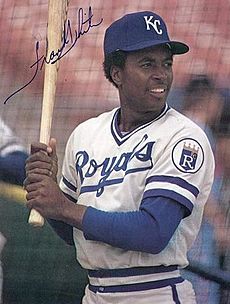Kansas City Royals facts for kids
Quick facts for kids Kansas City Royals |
|||||
|---|---|---|---|---|---|
|
|||||
|
|||||
| Major league affiliations | |||||
|
|||||
| Current uniform | |||||
| Retired numbers | |||||
| Colors | |||||
|
|||||
| Name | |||||
|
|||||
| Other nicknames | |||||
|
|||||
| Ballpark | |||||
|
|||||
| Major league titles | |||||
| World Series titles (2) |
|
||||
| AL Pennants (4) |
|
||||
| Central Division titles (1) | 2015 | ||||
| West Division titles (6) |
|
||||
| Wild card berths (2) |
|
||||
| Front office | |||||
| Principal owner(s) | John Sherman | ||||
| President | R. Brooks Sherman Jr. (President of Business Operations) | ||||
| President of baseball operations | J. J. Picollo | ||||
| General manager | J. J. Picollo | ||||
| Manager | Matt Quatraro | ||||
The Kansas City Royals are a professional baseball team from Kansas City, Missouri. They play in Major League Baseball (MLB) as part of the American League (AL) Central Division. The team started in 1969 as a new franchise.
The Royals have played in four World Series, winning twice in 1985 and 2015. They lost in the World Series in 1980 and 2014.
The name "Royals" comes from the American Royal, a famous livestock and horse show held every year in Kansas City since 1899. It also honors two former Negro league baseball teams that played in the area. One of these teams even had famous players like Satchel Paige and Jackie Robinson.
In 1968, the team held a contest to pick a name, and over 17,000 ideas were sent in. Sanford Porte, an engineer, suggested "Royals." He said it was because of Missouri's big livestock industry and the American Royal event. The team's owner, Ewing Kauffman, first voted against the name but later changed his mind.
The Royals joined the American League in 1969. The team was started by Kansas City businessman Ewing Kauffman. This happened after Senator Stuart Symington of Missouri pushed for a new team. Kansas City's previous team, the Athletics, had moved to Oakland in 1968. Since 1973, the Royals have played at Kauffman Stadium, which was first called Royals Stadium.
The team quickly became very good, reaching the playoffs seven times between 1976 and 1985. They won one World Series championship and another AL pennant. Star players like George Brett, Frank White, and Bret Saberhagen led the way.
After 1985, the team stayed competitive for a while but then had a tough period. From 1986 to 2013, the Royals did not make it to the playoffs for 28 seasons. This was one of the longest playoff droughts in baseball.
The team finally broke this streak in 2014. They earned a wild card spot and made it to the 2014 World Series. They lost to the San Francisco Giants in seven games. In 2015, led by players like Salvador Perez and Lorenzo Cain, the Royals won their first AL Central division title. They then defeated the New York Mets in the 2015 World Series to win their second World Series championship!
From 1969 to 2024, the Royals have won 4,208 games and lost 4,623 games. The team is currently owned by John Sherman.
Contents
- Team History
- Baseball Returns to Kansas City
- 1969–1979: Getting Started
- 1980–1984: First Pennant and a Famous Incident
- 1985: "The I-70 Series" and World Series Champions
- 1986–1994: Staying Competitive
- 1995–2002: Tough Times After Kauffman
- 2003: A Winning Season
- 2004–2008: Hitting Rock Bottom
- 2009–2012: Stadium Upgrades and More Rebuilding
- 2013: Getting Better
- 2014: Back to the World Series
- 2015: World Series Champions!
- 2016–2017: End of an Era
- 2018–Present: New Ownership and Rebuilding
- Uniform History
- Team Rivalries
- Baseball Hall of Famers
- Other Players of Note
- Current Roster
- Team Managers
- Minor League Teams
- Season Records
- All-Time Records
- Radio and Television
- Mascot
- See also
Team History
Baseball Returns to Kansas City
When the Kansas City Athletics moved to Oakland in 1967, Kansas City was left without a major league baseball team. Senator Stuart Symington of Missouri was very upset. He threatened to change laws unless Kansas City got a new team quickly. Major League Baseball agreed, and Kansas City was given a team to start playing in 1969.
Ewing Kauffman, a business leader, won the chance to own the new Kansas City team. He held a contest to name the team. Sanford Porte suggested "Royals" because of Missouri's large livestock industry and the famous American Royal event. The name was chosen from 17,000 ideas. The team's logo, a crown on a shield with "KC," was designed by Shannon Manning from Hallmark Cards.
1969–1979: Getting Started
The Royals played their first game on April 8, 1969, and won! In their first season, they won 69 games and lost 93. Lou Piniella won the AL Rookie of the Year Award that year.
The team quickly got better by making smart trades and developing young players. They brought in stars like Amos Otis, John Mayberry, and Hal McRae. They also grew their own talent, including future pitching stars Paul Splittorff, Dennis Leonard, and Steve Busby. Young infielders George Brett and Frank White also came up through their system.
In 1971, the Royals had their first winning season. In 1973, they started wearing their famous "powder blue" road uniforms. They also moved from Municipal Stadium to the new Royals Stadium (now Kauffman Stadium).
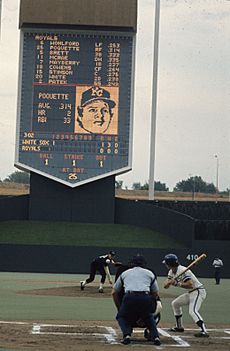
The 1973 All-Star Game was held at Royals Stadium. Otis and Mayberry were in the starting lineup for the American League.
Under manager Whitey Herzog, the Royals became a top team in the American League's Western Division. They won three division championships in a row from 1976 to 1978. In 1977, they won 100 games, their only 100-win season. However, they lost to the New York Yankees in the American League Championship Series three times in a row.
1980–1984: First Pennant and a Famous Incident
After finishing second in 1979, the Royals bounced back in 1980. Led by George Brett's amazing .390 batting average, they reached the ALCS. This time, they beat the New York Yankees in three straight games! Brett hit a home run off Yankees pitcher Goose Gossage to seal the win.
The Royals then went to their first World Series, but they lost to the Philadelphia Phillies in six games.
In 1983, a famous event called the "Pine Tar Incident" happened during a game against the New York Yankees. George Brett hit a home run that would have put the Royals ahead. But the umpires said his bat had too much pine tar on it, which was against the rules. They called him out, and Brett got very angry! Later, the American League president said the home run counted, and the Royals won the game.
In 1984, the Royals won their fifth division championship. They had strong pitching from young players like Bret Saberhagen and Mark Gubicza, along with Brett's hitting. However, they were swept by the Detroit Tigers in the ALCS.
1985: "The I-70 Series" and World Series Champions
In 1985, the Royals won their division again. Bret Saberhagen won the Cy Young Award for best pitcher, and George Brett had a great year. In the playoffs, the Royals were behind 2-0 and then 3-1 in both series. But they kept fighting back! In the ALCS against the Toronto Blue Jays, they came back from being down 3-1 to win 4-3.
1985 World Series
In the 1985 World Series, the Royals played against the cross-state St. Louis Cardinals. This was called the "I-70 Series" because both teams are in Missouri and connected by Interstate 70. The Royals again fell behind, 3 games to 1.
In Game 6, the Royals were losing 1-0 in the last inning. A controversial call at first base helped them, and they rallied to score two runs and win the game! This sent the series to Game 7. In Game 7, Bret Saberhagen pitched a shutout, and the Royals won 11-0, winning their first World Series title!
1986–1994: Staying Competitive
The Royals remained a strong team in the late 1980s. They had winning records and developed new stars like Bo Jackson and Kevin Seitzer. In 1989, they won 92 games, which was one of the best records in baseball, but they still missed the playoffs.
The early 1990s saw the team struggle more. Key players left, and Bo Jackson suffered a serious hip injury playing football. Even though they had winning records sometimes, they didn't make the playoffs. During this time, George Brett finished his amazing career. He won his third batting title in 1990, becoming the first player to win batting titles in three different decades. He also got his 3,000th hit.
In 1994, the Royals moved from the AL West to the new AL Central division.
1995–2002: Tough Times After Kauffman
The team faced challenges after General Manager John Schuerholz left in 1990 and owner Ewing Kauffman passed away in 1993. Kauffman had a plan to keep the team in Kansas City, but the team's performance declined.
The Royals started to trade away their best players like David Cone and Johnny Damon to save money. This led to many losing seasons. In 1999, they had their worst record ever at the time, losing 97 games. In 2002, they lost 100 games for the first time in team history.
2003: A Winning Season
The 2003 season brought a brief end to the losing. Manager Tony Peña led the team to a winning record (83–79) for the first time since 1994. He was named the American League Manager of the Year.
2004–2008: Hitting Rock Bottom
From 2004 to 2012, the Royals had nine straight losing seasons. In many of these years, they finished last in their division and lost at least 90 games. The worst years were 2004-2006, when they lost over 100 games each season. In 2005, they set a new team record by losing 106 games.
In 2007, the Royals signed pitcher Gil Meche to their largest contract ever. They also brought in new young players like Alex Gordon and Billy Butler. The team finished 69–93, which was better than the previous years.
2009–2012: Stadium Upgrades and More Rebuilding
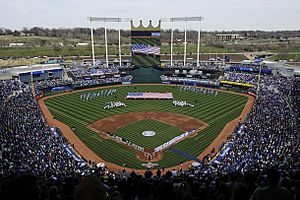
Before the 2009 season, Kauffman Stadium got a big makeover. The team started 2009 well, but then faded. They finished with a 65–97 record. The highlight of the season was pitcher Zack Greinke, who won the American League Cy Young Award.
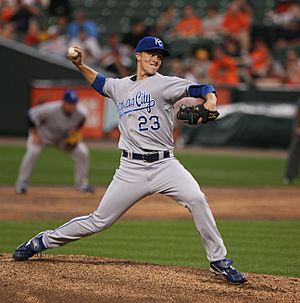
In 2010, manager Trey Hillman was fired, and Ned Yost took over. The team continued to struggle, finishing last in their division. In 2011 and 2012, they showed slight improvement but still had losing records.
Kauffman Stadium hosted the 2012 Major League Baseball All-Star Game on July 10, 2012. This was the third time Kansas City hosted the "Midsummer Classic."
2013: Getting Better
In December 2012, the Royals made a big trade to get pitchers James Shields and Wade Davis. This trade helped the team start winning again.
For most of the 2013 season, the Royals had a winning record. On September 22, they won their 82nd game, which meant their first winning season since 2003. They finished the season 86–76, their best record since 1994.
2014: Back to the World Series
The 2014 season was historic for the Royals. They made it to the postseason for the first time in 29 years! Their bullpen, with pitchers like Kelvin Herrera, Wade Davis, and Greg Holland, was one of the best ever.
On July 21, 2014, the Royals had a losing record. But they went on an amazing winning streak, winning 22 out of 27 games! They took first place in their division for a while and finished the season with 89 wins. Even though they finished second in their division, they earned their first-ever wild card spot.
In the playoffs, the Royals went on an incredible eight-game winning streak. They beat the Oakland Athletics in a thrilling Wild Card game that went to 12 innings. Then, they swept the Los Angeles Angels of Anaheim in the 2014 American League Division Series. They won two of those games in extra innings, setting an MLB record!
Next, they swept the Baltimore Orioles in the 2014 American League Championship Series. This meant they were going to the World Series for the first time since 1985! Their eight straight playoff wins in one year broke a major league record.
The Royals played the San Francisco Giants in the 2014 World Series. The Giants won Game 1, but the Royals tied the series in Game 2. The Royals won Game 3 in San Francisco to take the lead. However, the Giants won Games 4 and 5, putting the Royals behind. The Royals won Game 6 in a big way, 10-0, to force a Game 7.
In Game 7, the Royals lost a very close game, 3-2. The tying run was on third base in the last inning, but Salvador Pérez hit a foul ball to end the game and the series.
2015: World Series Champions!
After their exciting run in 2014, the Royals had an even better year in 2015. They won their division title for the first time since 1985! They finished the regular season with 95 wins, the best record in the American League.
In the ALDS, the Royals faced the Houston Astros. They were down 2-1 in the series and losing 6-2 in Game 4. But the Royals made an amazing comeback, scoring 5 runs in the 8th inning to win! They then won Game 5 to advance.
The Royals then defeated the Toronto Blue Jays in the ALCS. This sent them to the 2015 World Series to play the New York Mets.
The Royals beat the New York Mets 4 games to 1 to become the 2015 World Series champions! It was their first World Series title since 1985. They won the final game in 12 innings, coming back from being down 2-0 in the 9th inning. Salvador Pérez was named the World Series MVP.
2016–2017: End of an Era
After their World Series win, the Royals had a tougher time in 2016, finishing with an 81–81 record. The 2017 season was sad for the team, as pitcher Yordano Ventura passed away in a car accident. The Royals wore special patches on their jerseys to honor him. Many key players from the championship team left after the 2017 season, including Lorenzo Cain and Eric Hosmer.
2018–Present: New Ownership and Rebuilding
In 2018, the Royals began a new rebuilding phase. They traded some players for future talent and gave playing time to young players like Adalberto Mondesi and Brad Keller. The team won only 58 games that year. However, Whit Merrifield became a star, leading MLB in hits and stolen bases.
In 2019, John Sherman bought the team from David Glass. Manager Ned Yost retired after 10 seasons, having led the team to a franchise-record 746 wins. The Royals finished 2019 with 59 wins. Jorge Soler led the American League with 48 home runs.
In 2020, the season was shorter because of the COVID-19 pandemic. The Royals finished with a 26–34 record. In 2021, they improved to 74–88. Catcher Salvador Pérez had an amazing year, leading MLB in both home runs and runs batted in. Young star Bobby Witt Jr. continued to develop.
In 2022, J. J. Picollo became the new general manager. The team played many rookies, finishing with a 65–97 record. Manager Mike Matheny was fired.
Matt Quatraro was hired as manager for the 2023 season, and the team finished 56–106. For the 2024 season, the Royals signed new pitchers like Michael Wacha and Seth Lugo. The 2024 Royals made it to the playoffs, their first time since 2015! They swept the Baltimore Orioles in the Wild Card round but lost to the New York Yankees in the American League Division Series.
In 2025, former manager Ned Yost rejoined the team as an advisor.
Future Stadium Plans
Team owner John Sherman announced in 2022 that the Royals plan to move from Kauffman Stadium by 2030. They are looking at different locations in Kansas City for a new stadium. In 2024, voters in Jackson County did not approve a plan to help fund the new stadium. The team is still working on plans for a new ballpark that would open around 2027 or 2028.
Uniform History
Early Looks (1969–1982)
The Royals' first home uniforms were white with blue lettering. The road uniforms were blue with white lettering. In 1973, the team started wearing their famous powder blue road uniforms.
Button-Down Style (1983–2001)
In 1983, the Royals switched to button-down uniforms. The powder blue road uniforms now said "Royals" in script. In 1992, they went back to grey road uniforms. A blue alternate uniform was added in 1994.
Adding Black (2002–2005)
For a few years, the Royals added black to their colors. Their uniforms included black shadows on the letters and some black alternate jerseys.
New Alternates and Powder Blue Returns (2006–2021)
In 2006, black was removed from the uniforms. The team brought back the powder blue alternate uniform in 2008, which became very popular. After winning the 2015 World Series, they wore a special white alternate uniform with gold lettering.
Modern Look (2022–Present)
In 2022, the Royals updated their uniforms. The road uniforms went back to block "Kansas City" letters. They also introduced special "City Connect" uniforms that honored Kansas City's nickname, "City of Fountains." These uniforms are navy blue with powder blue accents.
Beginning in 2023, the Royals started wearing their full powder blue uniforms, including powder blue pants, for some games.
Team Rivalries
St. Louis Cardinals
The Royals have a big rivalry with the St. Louis Cardinals, another team from Missouri. This rivalry really started when the Royals beat the Cardinals in the 1985 World Series, which was called the "I-70 Series." The Cardinals' manager at the time, Whitey Herzog, used to manage the Royals!
Since 1997, the teams have played each other in regular season games. The Cardinals have won more games in the rivalry so far.
New York Yankees
The Royals and New York Yankees had a strong rivalry in the late 1970s and early 1980s. They played each other in the American League Championship Series four times in five years. The Yankees won three of those series, but the Royals won in 1980.
Players from that time, like Lou Pinella and George Brett, have said they really disliked each other's teams. The teams met again in the playoffs in 2024, with the Yankees winning.
Baseball Hall of Famers
| Kansas City Royals Hall of Famers | |||||||||
|---|---|---|---|---|---|---|---|---|---|
| Affiliation according to the National Baseball Hall of Fame and Museum | |||||||||
|
Ford C. Frick Award Recipients
| Kansas City Royals Ford C. Frick Award recipients | |||||||||
|---|---|---|---|---|---|---|---|---|---|
| Affiliation according to the National Baseball Hall of Fame and Museum | |||||||||
|
Other Players of Note
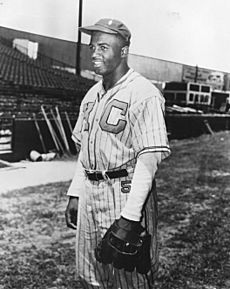
Team Captains
- George Brett 1989–1993
- Frank White 1989–1990
- Mike Sweeney 2003–2007
- Salvador Pérez 2023–present
Missouri Sports Hall of Fame
| Kansas City Royals in the Missouri Sports Hall of Fame | ||||
| No. | Player | Position | Tenure | Notes |
|---|---|---|---|---|
| – | Ewing Kauffman | Founder/Owner | 1969–1993 | Born near Garden City, grew up in Kansas City |
| – | Art Stewart | Scout | 1969–2021 | |
| – | George Toma | Groundskeeper | 1969–1999 | |
| — | Dayton Moore | GM | 2006–2021 | |
| 2, 37 | Fred Patek | SS | 1971–1979 | |
| 3 | Ned Yost | Manager | 2010–2019 | |
| 4, 7 | Alex Gordon | LF | 2007–2020 | |
| 5, 25 | George Brett | 3B/DH/1B | 1973–1993 | |
| 6 | Terry Pendleton | 3B | 1998 | |
| 6, 19, 32 | Willie Wilson | CF/LF | 1976–1990 | |
| 8, 22 | Jim Eisenreich | OF | 1987–1992 | |
| 7 | John Mayberry | 1B | 1972–1977 | |
| 8, 15, 28 | Mike MacFarlane | C | 1987–1994 1996–1998 |
|
| 11 | Hal McRae | OF/DH/Coach Manager |
1973–1987 1991–1994 |
|
| 12 | John Wathan | C Manager |
1976–1985 1987–1991 |
|
| 15 | Darrell Porter | C | 1977–1980 | Born in Joplin |
| 16 | Bo Jackson | OF/DH | 1987–1990 | |
| 9, 10, 18 | Jamie Quirk | C | 1975–1976 1978–1982 1985–1988 |
|
| 19, 20 | Frank White | 2B | 1973–1990 | Attended Longview Community College in Lee's Summit |
| 21 | Jeff Montgomery | RP | 1988–1999 | |
| 22 | Dennis Leonard | SP | 1974–1986 | |
| 23 | Mark Gubicza | SP | 1984–1996 | |
| 24 | Whitey Herzog | Manager | 1975–1979 | |
| 26 | Amos Otis | CF | 1970–1983 | |
| 29, 40 | Vince Coleman | LF | 1994–1995 | |
| 29 | Dan Quisenberry | RP | 1979–1988 | |
| 29 | Mike Sweeney | C/1B/DH | 1995–2007 | |
| 30 | Orlando Cepeda | 1B | 1974 | |
| 25, 34 | Paul Splittorff | SP | 1970–1984 | |
| 36 | Gaylord Perry | SP | 1983 | |
| 37 | Jeff Suppan | P | 1998–2002 | |
| 39 | Al Hrabosky | RP | 1978–1979 | |
| 40 | Steve Busby | SP | 1972–1980 | |
Retired Numbers
|
The Royals have retired the numbers of former players George Brett (No. 5) and Frank White (No. 20). Former manager Dick Howser's No. 10 was retired after he passed away in 1987. Jackie Robinson's No. 42 is retired across all of Major League Baseball.
Out of Circulation, But Not Retired
Number 29, worn by Royals stars Dan Quisenberry and Mike Sweeney, has not been given to another player since Sweeney left in 2007.
Royals Hall of Fame
| Kansas City Royals Hall of Fame | ||||
| Inducted | No. | Player | Position | Tenure |
|---|---|---|---|---|
| 1986 | 40 | Steve Busby | SP | 1972–1980 |
| 26 | Amos Otis | CF | 1970–1983 | |
| 1987 | 10 | Dick Howser | Manager | 1981–1986 |
| 1 | Cookie Rojas | 2B | 1970–1977 | |
| 25, 34 | Paul Splittorff | SP | 1970–1984 | |
| 1989 | 22 | Dennis Leonard | SP | 1974–1986 |
| 11 | Hal McRae | OF/DH/Coach Manager |
1973–1987 1991–1994 |
|
| 1992 | — | Joe Burke | GM President |
1974–1981 1981–1992 |
| 32, 37 | Larry Gura | SP | 1976–1985 | |
| 2, 37 | Freddie Patek | SS | 1971–1979 | |
| 1993 | — | Ewing Kauffman | Owner and tributary of name of Kauffman Stadium | 1969–1993 |
| 1994 | 5, 25 | George Brett |
3B/DH/1B | 1973–1993 |
| 1995 | 19, 20 | Frank White | 2B | 1973–1990 |
| 1996 | — | Muriel Kauffman | Executive and wife of Ewing | 1969–1995 |
| 7 | John Mayberry | 1B | 1972–1977 | |
| 1998 | 29 | Dan Quisenberry | RP | 1979–1988 |
| 2000 | 24 | Whitey Herzog | Manager | 1975–1979 |
| 6, 19, 32 | Willie Wilson | CF/LF | 1976–1990 | |
| 2003 | 21 | Jeff Montgomery | RP | 1988–1999 |
| 2004 | — | Denny Matthews |
Radio announcer | 1969–present |
| 2005 | 18, 31 | Bret Saberhagen | SP | 1984–1991 |
| 2006 | 23 | Mark Gubicza | SP | 1984–1996 |
| 2008 | — | Art Stewart | Scout | 1969–2021 |
| 2011 | 17, 55 | Kevin Appier | SP | 1989–1999 2003–2004 |
| 2012 | — | George Toma | Groundskeeper | 1969–1999 |
| 2015 | 29 | Mike Sweeney | C/1B/DH | 1995–2007 |
| 2023 | 3 | Ned Yost | Manager | 2010–2019 |
| 2024 | 16 | Bo Jackson | LF | 1986–1990 |
| 2024 | — | Cedric Tallis | General Manager | 1968-1974 |
| 2025 | 4 | Alex Gordon | LF | 2007–2020 |
Current Roster
|
Kansas City Royals 2023 spring training roster
|
||||||
|---|---|---|---|---|---|---|
| 40-man roster | Non-roster invitees | Coaches/Other | ||||
|
Pitchers
|
Catchers
Infielders
Outfielders
|
|
Manager
Coaches
40 active, 0 inactive, 0 non-roster invitees
|
|||
Team Managers
Statistics current through 2024 season
| # | Manager | Seasons | Wins | Losses | Pct | PA | PW | PL | WS |
|---|---|---|---|---|---|---|---|---|---|
| 1 | Joe Gordon† | 1969 | 69 | 93 | .426 | — | — | — | — |
| 2 | Charlie Metro | 1970 | 19 | 33 | .365 | — | — | — | — |
| 3 | Bob Lemon† | 1970–1972 | 207 | 218 | .487 | — | — | — | — |
| 4 | Jack McKeon | 1973–1975 | 215 | 205 | .512 | — | — | — | — |
| 5 | Whitey Herzog† | 1975–1979 | 410 | 304 | .574 | 3 | 5 | 9 | 0 |
| 6 | Jim Frey | 1980–1981 | 127 | 105 | .547 | 1 | 5 | 4 | 0 |
| 7 | Dick Howser | 1981–1986 | 404 | 365 | .525 | 3 | 8 | 12 | 1 |
| 8 | Mike Ferraro | 1986 | 36 | 38 | .486 | — | — | — | — |
| 9 | Billy Gardner | 1987 | 62 | 64 | .492 | — | — | — | — |
| 10 | John Wathan | 1987–1991 | 287 | 270 | .515 | — | — | — | — |
| 11 | Bob Schaefer | 1991 | 1 | 0 | 1.000 | — | — | — | — |
| 12 | Hal McRae | 1991–1994 | 286 | 277 | .508 | — | — | — | — |
| 13 | Bob Boone | 1995–1997 | 181 | 206 | .468 | — | — | — | — |
| 14 | Tony Muser | 1997–2002 | 317 | 431 | .424 | — | — | — | — |
| 15 | John Mizerock | 2002 | 5 | 8 | .385 | — | — | — | — |
| 16 | Tony Peña | 2002–2005 | 198 | 285 | .410 | — | — | — | — |
| — | Bob Schaefer | 2005 | 5 | 12 | .294 | — | — | — | — |
| 17 | Buddy Bell | 2005–2007 | 174 | 262 | .399 | — | — | — | — |
| 18 | Trey Hillman | 2008–2010 | 152 | 207 | .423 | — | — | — | — |
| 19 | Ned Yost | 2010–2019 | 687 | 736 | .483 | 2 | 22 | 9 | 1 |
| 20 | Mike Matheny | 2020–2022 | 165 | 219 | .430 | — | — | — | — |
| 21 | Matt Quatraro | 2023–present | 142 | 182 | .438 | 1 | 3 | 3 | 0 |
| Totals | 4,205 | 4,623 | .476 | 10 | 43 | 37 | 2 | ||
Minor League Teams
The Kansas City Royals have seven minor league teams where young players develop their skills.
| Class | Team | League | Location | Ballpark | Affiliated |
|---|---|---|---|---|---|
| Triple-A | Omaha Storm Chasers | International League | Papillion, Nebraska | Werner Park | 1969 |
| Double-A | Northwest Arkansas Naturals | Texas League | Springdale, Arkansas | Arvest Ballpark | 2008 |
| High-A | Quad Cities River Bandits | Midwest League | Davenport, Iowa | Modern Woodmen Park | 2021 |
| Single-A | Columbia Fireflies | Carolina League | Columbia, South Carolina | Segra Park | 2021 |
| Rookie | ACL Royals | Arizona Complex League | Surprise, Arizona | Surprise Stadium | 2022 |
| DSL Royals Fortuna | Dominican Summer League | Boca Chica, Santo Domingo | Kansas City Royals Complex | 2024 | |
| DSL Royals Ventura |
Season Records
- Highest batting average: .390, George Brett (1980)
- Most games: 162, Al Cowens (1977), Hal McRae (1977), Carlos Beltrán (2002), Billy Butler (2013), Alcides Escobar (2014, 2016), Whit Merrifield (2019), Jorge Soler (2019)
- Most runs: 136, Johnny Damon (2000)
- Most hits: 230, Willie Wilson (1980)
- Highest slugging %: .664, George Brett (1980)
- Most doubles: 54, Hal McRae (1977)
- Most triples: 21, Willie Wilson (1985)
- Most home runs: 48, Jorge Soler (2019), Salvador Perez (2021)
- Most grand slams: 3, Danny Tartabull (1988)
- Most RBIs: 144, Mike Sweeney (2000)
- Most stolen bases: 83, Willie Wilson (1979)
- Most wins (pitcher): 23, Bret Saberhagen (1989)
- Lowest ERA (pitcher): 2.08, Roger Nelson (1972)
- Strikeouts (pitcher): 244, Dennis Leonard (1977)
- Most strikeouts, single game (pitcher): 16, Danny Duffy (2016)
- Most strikeouts, Reliever: 109, Wade Davis (2014)
- Complete games (pitcher): 21, Dennis Leonard (1977)
- Shutouts (pitcher): 6, Roger Nelson (1972)
- Saves (pitcher): 47, Greg Holland (2013)
All-Time Records
- Highest batting average: .306, George Brett
- Most games: 2,707, George Brett
- Most runs: 1,583, George Brett
- Most hits: 3,154, George Brett
- Highest Slugging %: .518, Danny Tartabull
- Most doubles: 665, George Brett
- Most triples: 137, George Brett
- Most home runs: 317, George Brett
- Most RBIs: 1,596, George Brett
- Most stolen bases: 612, Willie Wilson
- Most wins (pitcher): 166, Paul Splittorff
- Lowest ERA (pitcher): 2.55, Dan Quisenberry
- Strikeouts (pitcher): 1,458, Kevin Appier
- Complete games (pitcher): 103, Dennis Leonard
- Shutouts (pitcher): 23, Dennis Leonard
- Saves (pitcher): 304, Jeff Montgomery
Radio and Television
The Royals games are broadcast on radio stations KFNZ-FM (96.5) and KFNZ (610 AM). The main radio announcers are Denny Matthews and Ryan Lefebvre.
Televised games are shown on FanDuel Sports Network Kansas City. In 2007, Denny Matthews won the Ford C. Frick Award for his great work in baseball broadcasting.
Mascot
Sluggerrr is the official mascot of the Royals. Sluggerrr is a lion who first appeared in 1996. During games, Sluggerrr cheers on the team and fans, and even shoots hot dogs into the stands with an air cannon!
See also
 In Spanish: Kansas City Royals para niños
In Spanish: Kansas City Royals para niños
- Kansas City Royals Baseball Academy
- List of Kansas City Royals seasons
- Sports in the Kansas City metropolitan area




